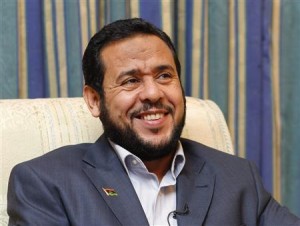By Libya Herald staff.

Tripoli, 6 February 2015:
Abdul-Hakim Belhaj had pinned the blame for the current political crisis wholly on Khalifa Hafter. The Opration . . .[restrict]Dignity leader was a criminal for beginning the war currently being waged in Libya, the former head of the Libyan Islamic Fighting Group (LIFG) said in an interview published by Euronews.
“It started when retired General Khalifa Hafter came back onto the scene, ”, he said in a statement in which, bizarrely, he also implied that Hafter had formed the House of Representatives (HoR) in Tobruk. Belhaj considers it illegitimate.
Belhaj also asserted that the UAE was supporting Hafter, providing “aircraft, weapons, ammunition and armour to those who are killing the Libyan people”.
The sole legitimate armed group, he said, was Libya Dawn. Prime Minister Abdullah Al-Thinni, when he was defence minister, gave Libya Dawn authority, Belhaj maintained. It was now carrying out the orders of the legitimate ruling body—the General National Congress (GNC).
Asked about the dialogue talks, Belhaj said he supported them and had called for them, and had himself met with UNSMIL representatives. However, he did not think the Geneva meetings would be effective because people “far removed from what is influencing politics in Libya” were invited. He did not elaborate further on this.
In one of several questions alluding to Belhaj’s past as leader of the LIFG, Euronews asked, “Are you a fighter under the guise of a politician?” Belhaj did not directly answer this question, however earlier in the interview he claimed that he was no longer a fighter but a politician and insisted he was not currently leading an armed group.
“The Libyan Islamic Fighting Group,” said Belhaj, “has been terminated. It ceased to exist at the downfall of the Qaddafi regime.”
He was, he said, now leading the Al-Watan Party. As a politician his goal was to “put the interests of the country and its citizens first,” he claimed, speaking of his desire to facilitate discussions with the various factions and work to find an end to the present crisis.
Belhaj also did not directly answer a question regarding his current “control” of Tripoli. He responded instead by talking about how a series of weak governments since the revolution have led to Libya being “awash” with militias.
When asked about the action he had filed against the British government, accusing it of being involved in his torture while he was in a Libyan prison under the Qaddafi regime, Belhaj said he deserved an acknowledgement of culpability and an apology from the British government. [/restrict]








